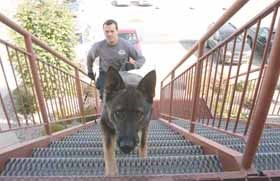Two local area RCMP officers are continuing their efforts to become dog handlers within the force.
Constable Nick Popovic with the Yorkton rural detachment is now working with his first pup. He was given the pup at seven weeks of age, and has been helping the German Shepherd take its first steps to maybe one day being a police dog.
"Basically it's getting her comfortable with a whole bunch of different things," he explained last week as he helped coax Elvie over the metal bleachers at the Farrell Agencies Arena in the city. Popovic said the pup has to be familiar with different surfaces, sounds and just being around people.
Popovic has been helping with training other dogs in the area, often being the person running across fields for young dogs to track. He has aspirations of being a dog handler with the force, and helping raise Elvie is a step in that process, a process he noted is a long one.
"They're taking guys with up to three years (working with dogs)," he said, adding that is just to get into the handler course. " It's a long road to go."
It is a road whether for a prospective handler, or a dog, where regular evaluations are made to determine if they have what it takes to be part of a rather exclusive wing of the RCMP -- at present there are only seven handler positions in Saskatchewan.
Popovic said in the case of Elvie, the dog is evaluated four times a year to make sure it is progressing in the traits needed to make a good police dog.
Locally pup handlers get some sage advice along the way from Corporal Chris Lohnes, the RCMP dog handler based out of the Yorkton rural detachment. In addition to working with his own dog on cases throughout the region, he is also helping develop younger dogs and prospective handlers for the force.
In addition to Popovic, Cst. Cory Dowling with the Canora detachment, Cst. Kevin Dyke with the Punnichy detachment and Phil Vincent stationed here in the city are all in the process of taking on a pup.
Lohnes said there is a definite need within the force for new handlers, with about 30 of the current handlers in Canada eligible to retire.
If Elvie passes the tests, Popovic will be able to keep the pup for about 12-months.
"As long as she passes I'll work with her for about a year," he said.
At about a year of age a prospective dog is handed off to an officer who will go through the final training with it.
"They get to know each other and build that bond," said Popovic.
If a pup does fail along the way, they are either adopted out as pets, or might end up in a more specialized role depending on what their strengths and weakness are.
Const. Chris Pshyk helped raise a pup which had a good nose for tracking, but lacked the aggressiveness to be a regular police dog. The dog ended up being trained as a 'sniffer' dog, used only to search out drugs.
"It all depends how they're doing in the program," he said.
Pshyk has become a veteran of starting pups.
"I've got my fifth right now I've been raising pups for three years now," he said, adding he hasn't had every one a year, but he and his current dog Durc have been together the longest, at about 10 months.
Pshyk, with the RCMP detachment at Moosomin, said he is hoping the fact he still has Durc might be a hunt he is close to being accepted into handler training and will be able to take Durc with him. He said as a new handler working with a dog which they are very familiar with would be an asset.
"It's creating the bond, getting the dog to want to work with you," he said.
As for final training, undertaken at the RCMP dog facility in Innisfail, Alta., Pshyk said dogs are usually 18-month-to-two-years of age.
Durc, at just over a year is nearly full grown in terms of size, said Pshyk, but he added "he's still a teenager in his head. He doesn't have the attention span at one year of age as an adult dog."
Pshyk said in working with young dogs they are laying the foundation for what they will face if they become police dogs.
"Everything's baby steps," he said.
As an example Pshyk pointed to training in following a scent trail. Over time the course laid down for a dog to follow "keeps getting longer and more complex."
And where a young pup like Elvie might be enticed to stay on task with a piece of dog food as a reward, older dogs gets some play time.
"You want to keep the dog interested," said Pshyk. "You always want to end a session with them wanting more You always end on a good note."



